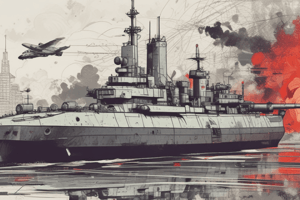Podcast
Questions and Answers
What is the primary factor attributed to the caution exercised by dominant powers in the postwar era, according to John Lewis Gaddis?
What is the primary factor attributed to the caution exercised by dominant powers in the postwar era, according to John Lewis Gaddis?
- Workings of the nuclear deterrent (correct)
- Shift in global economic power structures
- Change in conventional military strategy
- Increase in diplomatic efforts
According to Lebow and Stein, what was the reality of the Soviet-American conflict from the late 1960s onward?
According to Lebow and Stein, what was the reality of the Soviet-American conflict from the late 1960s onward?
- Mutually assured victory
- Conventional war readiness
- Arms race escalation
- Mutually assured destruction (correct)
What is the key distinction between nuclear conflicts and conventional conflicts of the past or present, according to Lebow and Stein?
What is the key distinction between nuclear conflicts and conventional conflicts of the past or present, according to Lebow and Stein?
- Diplomatic efforts
- Scale of destruction
- Economic motivations
- Fear of consequences (correct)
What is the outcome of the acknowledgment and refraining from challenging each other's vital interests by US and Soviet leaders, according to Lebow and Stein?
What is the outcome of the acknowledgment and refraining from challenging each other's vital interests by US and Soviet leaders, according to Lebow and Stein?
What is the main challenge to the nuclear revolution theory, according to the text?
What is the main challenge to the nuclear revolution theory, according to the text?
What is the significance of the 'most far-reaching arms control' in the context of nuclear vulnerability, according to Lebow and Stein?
What is the significance of the 'most far-reaching arms control' in the context of nuclear vulnerability, according to Lebow and Stein?
What is the key aspect of deterrence in a nuclear world?
What is the key aspect of deterrence in a nuclear world?
What is the limitation of nuclear deterrence?
What is the limitation of nuclear deterrence?
What is the primary objective of military action, according to Waltz?
What is the primary objective of military action, according to Waltz?
What is the difference between conventional and nuclear weapons, according to Waltz?
What is the difference between conventional and nuclear weapons, according to Waltz?
What is the implication of nuclear stalemate on the use of conventional forces?
What is the implication of nuclear stalemate on the use of conventional forces?
What is the constant possibility in a world with nuclear states, according to Waltz?
What is the constant possibility in a world with nuclear states, according to Waltz?
What is the primary goal of a defense strategy?
What is the primary goal of a defense strategy?
According to deterrence by punishment, what happens to an aggressor if it does attack?
According to deterrence by punishment, what happens to an aggressor if it does attack?
For a deterrent threat to be effective, what condition must be met?
For a deterrent threat to be effective, what condition must be met?
What is one of the three requirements for a deterrent weapon?
What is one of the three requirements for a deterrent weapon?
Why are nuclear weapons particularly effective as a deterrent?
Why are nuclear weapons particularly effective as a deterrent?
What is the formula for determining the effectiveness of a deterrent threat?
What is the formula for determining the effectiveness of a deterrent threat?
What is the key implication of nuclear weapons for the use of force, according to nuclear revolution theorists?
What is the key implication of nuclear weapons for the use of force, according to nuclear revolution theorists?
According to Kenneth Waltz, what are the two pervasive beliefs that have given nuclear weapons a bad name?
According to Kenneth Waltz, what are the two pervasive beliefs that have given nuclear weapons a bad name?
What is the possibility afforded to nations that possess nuclear weapons, according to Waltz?
What is the possibility afforded to nations that possess nuclear weapons, according to Waltz?
What type of defense is not possible against nuclear attack, according to Waltz?
What type of defense is not possible against nuclear attack, according to Waltz?
What is the chief purpose of military establishments in the nuclear age, according to nuclear revolution theorists?
What is the chief purpose of military establishments in the nuclear age, according to nuclear revolution theorists?
What is the significance of nuclear weapons in the context of international relations, according to nuclear revolution theorists?
What is the significance of nuclear weapons in the context of international relations, according to nuclear revolution theorists?
What is the primary purpose of a military establishment according to Bernard Brodie's 1946 statement, and how does it highlight the significance of nuclear weapons?
What is the primary purpose of a military establishment according to Bernard Brodie's 1946 statement, and how does it highlight the significance of nuclear weapons?
What is the notable absence in international politics since 1945, and what does it suggest about the impact of nuclear weapons?
What is the notable absence in international politics since 1945, and what does it suggest about the impact of nuclear weapons?
What is the key argument for the nuclear revolution, and how does it relate to the concept of deterrence?
What is the key argument for the nuclear revolution, and how does it relate to the concept of deterrence?
What is the significance of the 1945 date in the context of the nuclear revolution, and what does it imply about the impact of nuclear weapons?
What is the significance of the 1945 date in the context of the nuclear revolution, and what does it imply about the impact of nuclear weapons?
What is the central debate surrounding the nuclear revolution, and what is the key question that it raises?
What is the central debate surrounding the nuclear revolution, and what is the key question that it raises?
How do nuclear weapons, according to the narrow view, achieve deterrence and replace brute force with coercion?
How do nuclear weapons, according to the narrow view, achieve deterrence and replace brute force with coercion?
What is the primary benefit of the nuclear revolution, according to the broad view?
What is the primary benefit of the nuclear revolution, according to the broad view?
What is the main argument of John Mueller's 'The Essential Irrelevance of Nuclear Weapons'?
What is the main argument of John Mueller's 'The Essential Irrelevance of Nuclear Weapons'?
How does the nuclear revolution, according to Gray, change the concept of victory in international relations?
How does the nuclear revolution, according to Gray, change the concept of victory in international relations?
What is the role of nuclear weapons in the context of strategic thought in America, according to Trachtenberg?
What is the role of nuclear weapons in the context of strategic thought in America, according to Trachtenberg?
What is the distinction between nuclear conflicts and conventional conflicts, according to the broad view of the nuclear revolution?
What is the distinction between nuclear conflicts and conventional conflicts, according to the broad view of the nuclear revolution?
Flashcards are hidden until you start studying
Study Notes
Strategic Deterrent and Nuclear Weapons
- The concept of deterrence involves dissuading an attacker through the costs or punishment that will be imposed if they do attack.
- There are three types of strategies: offense, defense, and deterrence.
- Offense aims to move rapidly and take territory, while defense aims to protect territory and ward off aggressors.
- Deterrence, on the other hand, focuses on punishment and aims to persuade potential aggressors not to attack.
Deterrence by Punishment
- Deterrence by punishment relies on retaliation to persuade potential aggressors not to attack.
- This type of deterrence does not attempt to deny or block an attack, but instead focuses on imposing punishment if an attack occurs.
- For deterrence to be effective, the threat must promise to do more harm and impose more costs than the benefits that would be gained through the action to be deterred.
Requirements for a Deterrent Weapon
- There are three requirements for a deterrent weapon:
- Destructive power
- No effective defense against the retaliatory blow
- Clear costs that will be inflicted by the punishment
The Destructive Power of Nuclear Weapons
- The destructive power of nuclear weapons is sufficient to outweigh the prospective benefits of an attack.
- Nuclear weapons are unique in their ability to act as a strategic deterrent due to their immense destructive power.
Nuclear Revolution Theorists
- Nuclear revolution theorists argue that nuclear weapons have changed the way states can use force and have made deterrence a more viable option.
- Kenneth Waltz and Robert Jervis are notable nuclear revolution theorists.
- They argue that the ability to inflict punishment no longer depends on progress on the battlefield, and that deterrence of war by the threat of punishment becomes possible.
Challenges to the Nuclear Revolution
- Some challenges to the nuclear revolution include:
- The lack of major power war or the explanation for that lack
- The idea that deterrence depends on what one can do, not what one will do
- The absolute nature of nuclear weapons, which makes them different from conventional weapons
- The limits of nuclear deterrence, which may only work against major aggression at the center
- The importance of political behavior and military action being related to an objective
Waltz's Views
- Waltz argues that nuclear weapons are different from conventional weapons and dominate strategy.
- He also argues that nuclear weapons have made war-fighting strategies obsolete, and that no one has shown how a war could be fought with nuclear weapons.
- Waltz believes that nuclear stalemate limits the use of conventional forces and reduces the extent of the gains one can seek without risking devastation.
Broad and Narrow Understandings of Nuclear Revolution
- There are two versions of the nuclear revolution:
- Narrow view: Nuclear weapons are different and act to discourage war through nuclear deterrence.
- Broad view: Nuclear weapons do more than discourage war; they shift competition away from military competition to other arenas.
Studying That Suits You
Use AI to generate personalized quizzes and flashcards to suit your learning preferences.




